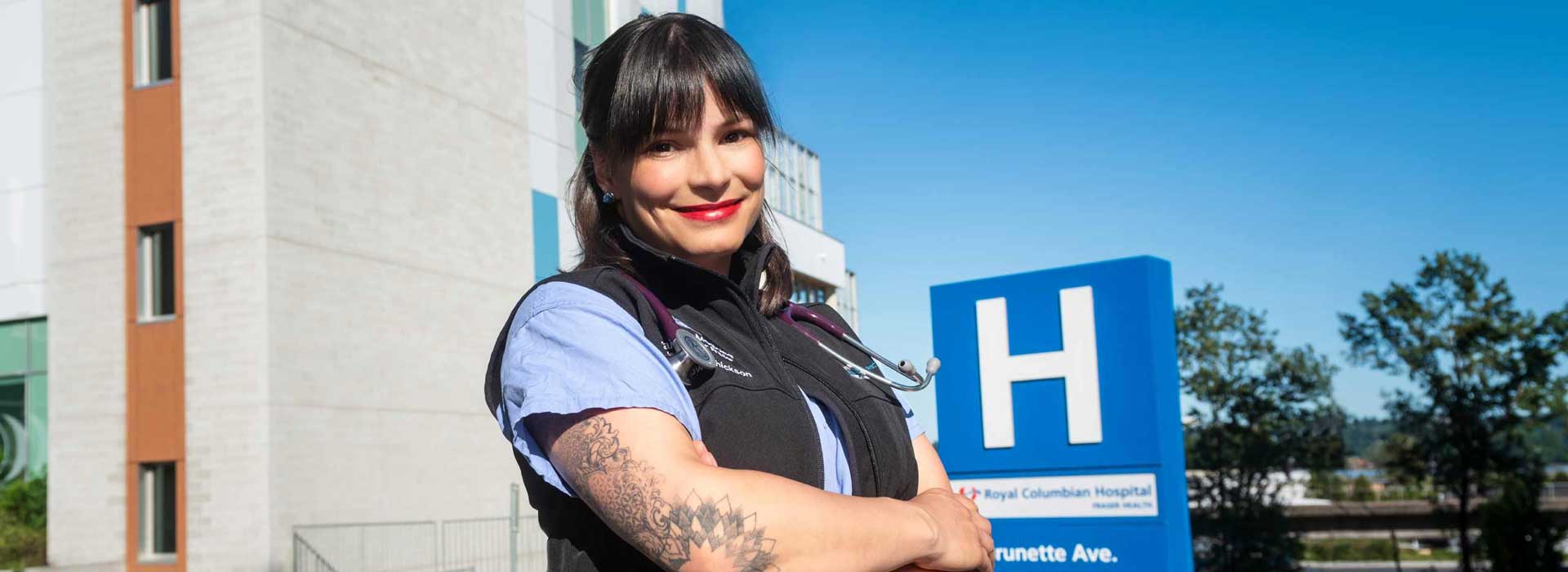
UBC medical resident Dr. Willow Thickson is helping to create a safer space for Indigenous patients in B.C. She is training at hospitals including Royal Columbian in New Westminster. Photo: Paul Joseph/UBC Brand & Marketing
Bridging gaps in community health care
By Carolyn Ali
Change starts locally. Here’s how people working in Metro Vancouver and the Fraser Valley are making our health-care system more diverse and inclusive.
Dr. Willow Thickson knows that the relationship a patient has with their family doctor can make or break their medical care. For starters, patients need to trust their physicians enough to open up to them. If they can relate to their doctor and speak without fear of judgement, their doctor is more likely to be able to assess their needs and guide them toward better health.
Strong relationships are one reason why Dr. Thickson is training to become a family doctor at UBC. Upon completing her training at hospitals including Royal Columbian in New Westminster, Eagle Ridge in Port Moody, and Burnaby Hospital, she plans to one day practise as a family doctor in the region. “I got into medicine to bridge the gaps in health outcomes for my people,” she says. “I want to stay here because of my connection to the community in the Fraser.”
— Dr. Willow Thickson, UBC medical resident
Dr. Thickson – who identifies as Cree, Ashininaabe and Métis from the Michel First Nation in Alberta – moved to Vancouver 11 years ago to do an undergraduate degree in Kinesiology at UBC. Since then, she’s earned her MD degree and is completing a Master’s of Health Science at UBC as well. Her family carries the scars of Canada’s Indian residential school history, and she has overcome profound challenges to get to where she is today. “An incredible community of Indigenous people in Vancouver has really supported me along the way,” she says.
Throughout her time at UBC she has travelled to a majority of the Indigenous nations in British Columbia; during her undergrad doing research on Indigenous-related cardiovascular disease and diabetes, for part of UBC’s unique rural clinical training rotations as a medical student, and in her free time.
UBC’s Faculty of Medicine provides students and medical residents with training experiences in urban, regional, community and remote settings throughout BC at more than 80 training sites across the province.
Every year more than 26,500 UBC student and resident rotations take place in hospitals, primary care settings and clinics in Vancouver and south of the Fraser, where learners train alongside UBC clinical faculty in areas such as family practice, emergency medicine, psychiatry, midwifery and physical therapy.
— Dr. Willow Thickson, UBC medical resident
Dr. Thickson has just started her two-year family medicine residency from her home base at Royal Columbian Hospital in New Westminster. Since 2000, more than 2,450 UBC grads are practising in Vancouver and the Fraser; of those 1,050 are family doctors and 1,401 are generalists and specialists.
Her patients include Indigenous peoples who live in the urban region while maintaining ties to their home communities. She believes her background and community connections help people relate to her, especially those who are hesitant to interact with the health-care system. “I’ll tell a patient a story of hunting or fishing in their community, and you’ll see their demeanor change; their body relaxes,” she says. “You see them open up and they become more comfortable dealing with you as a physician.”
Dr. Thickson hopes that her journey to become a doctor will inspire others. “When we start graduating more Indigenous health-care professionals – whether that’s occupational therapists, physical therapists, nurses or respiratory therapists – people start to see themselves in their care team. They know that they can talk to you and might not fear judgement or racism – they open up. That helps to create a safe space and break down barriers for access to care.”
Having cultivated strong relationships in the Fraser Health region, Dr. Thickson is looking forward to opening her practice here once she’s finished her residency. “Becoming a family physician has been quite the journey for me, but I owe my success to the community I’m part of,” she says. “The community has held me up. This is my home.”
This article is republished from Beyond. You can read the original article here.
Share this Story
Published: July 5, 2021
